The breaker panel upgrade cost in Nova Scotia typically ranges from $1,500 to $4,500, depending on several key factors. Here's what you need to know about pricing:
Common Upgrade Scenarios:
Key Cost Factors:
Your home's electrical panel is like the heart of your electrical system - it distributes power safely throughout your property. But as one homeowner finded, "Who wants the lights to go out every time they use the microwave?" This frustrating scenario highlights why many Canadian homes need electrical upgrades.
Modern homes demand significantly more electricity than systems installed decades ago were designed to handle. From electric vehicle chargers to smart home devices, today's electrical needs often exceed what older 60-amp or 100-amp panels can safely provide.
An electrical panel upgrade isn't just about convenience - it's about safety. Electrical issues cause over 51,000 fires annually, making this upgrade a critical investment in your family's protection and your home's value.
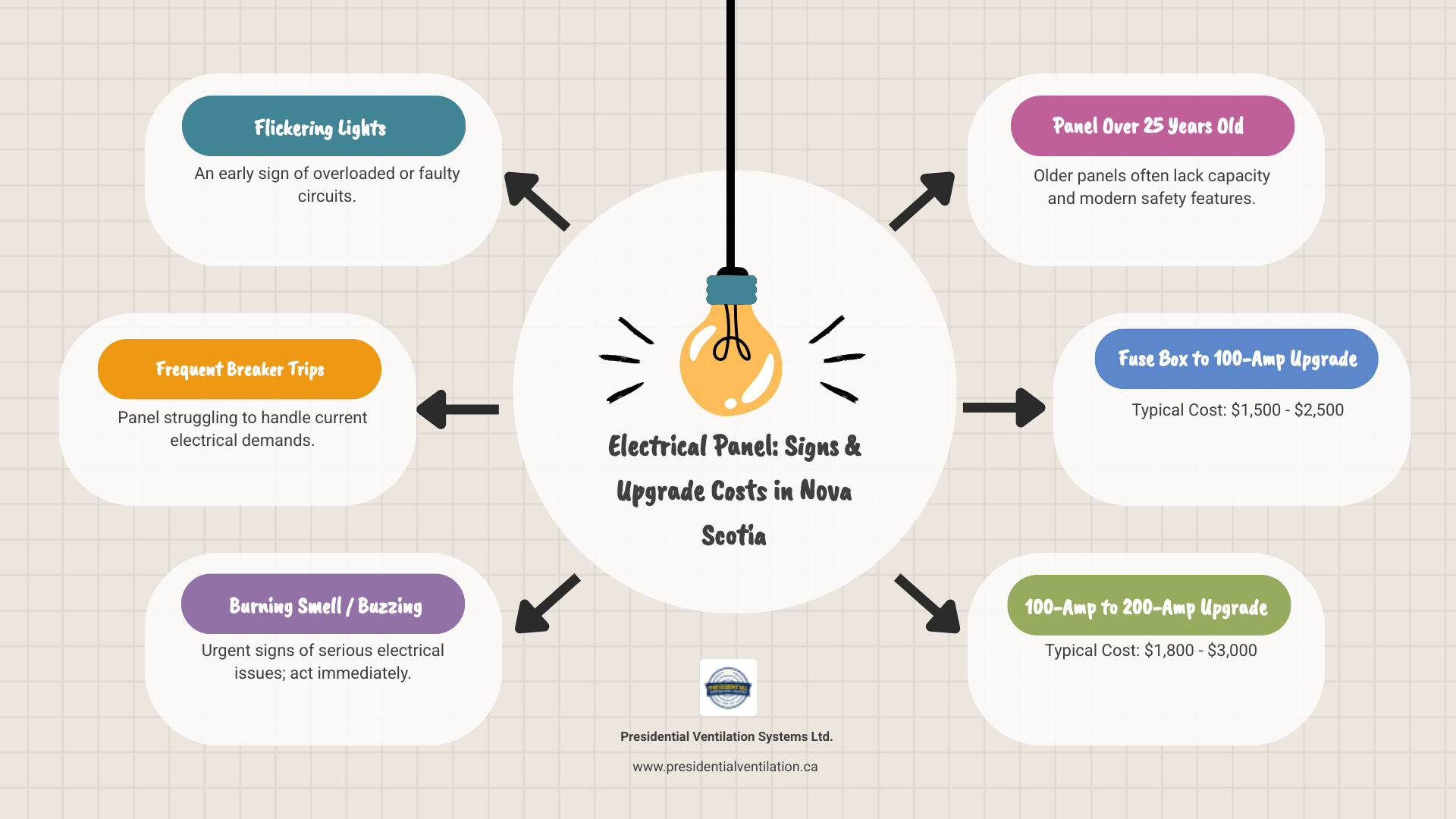
Today's homes are power-hungry, with EV chargers, smart appliances, home offices, and multiple streaming devices running simultaneously. Most electrical panels installed decades ago simply weren't designed for this modern lifestyle.
Your home will show warning signs when your electrical system is struggling. Ignoring them can lead to serious safety hazards.
Upgrading your panel is an investment in your family's safety and your home's future, with benefits beyond just preventing tripped breakers.
Understanding the factors that influence the breaker panel upgrade cost helps explain the pricing for this important home improvement. In Nova Scotia, a typical 100-amp to 200-amp upgrade ranges from $2,500 to $3,500. Simpler jobs may cost less, while complex ones can be more.
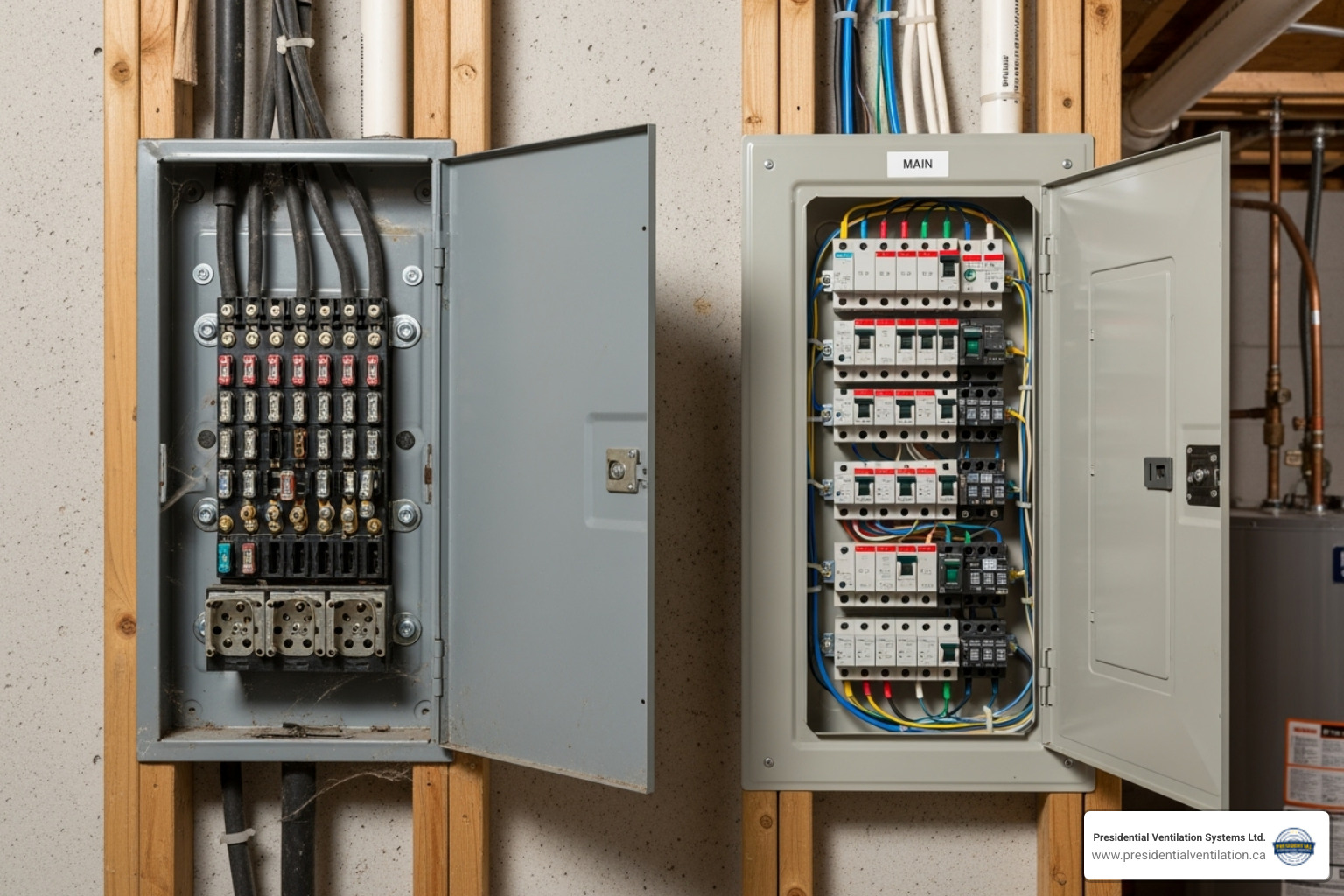
The final price is a sum of several factors:
We know this is a significant investment, which is why we offer various financing options to help make it more manageable.
Every home is different, but here are the most common upgrade scenarios:
Upgrade ScenarioTypical Cost Range (CAD)NotesFuse box to 100-amp breaker panel$1,500 - $2,500Perfect for older homes still using fuses. This upgrade brings you into the modern world with much better safety and convenience.60-amp to 100-amp service$1,800 - $2,200Common in very old homes. While 100 amps covers basic needs, you might want to consider jumping straight to 200 amps for future-proofing.100-amp to 200-amp service$1,800 - $3,000This is the sweet spot for most homes. A 200-amp panel handles everything you've got now, plus leaves room for that EV charger or hot tub you're dreaming about.200-amp to 400-amp service$3,500 - $5,000+Usually reserved for large homes or properties with serious electrical demands - think heated pools, workshops, or multiple HVAC systems.
Material costs can fluctuate with supply chain issues, which affects the final price.
Your home's unique situation plays a huge role in the final breaker panel upgrade cost.
The bottom line is that company size and overhead affect pricing, which is why getting multiple quotes is so important. We are always happy to provide a detailed, honest estimate.
Knowing what to expect during a breaker panel upgrade can ease anxiety. A professional installation is a well-orchestrated process focused on safety and efficiency.
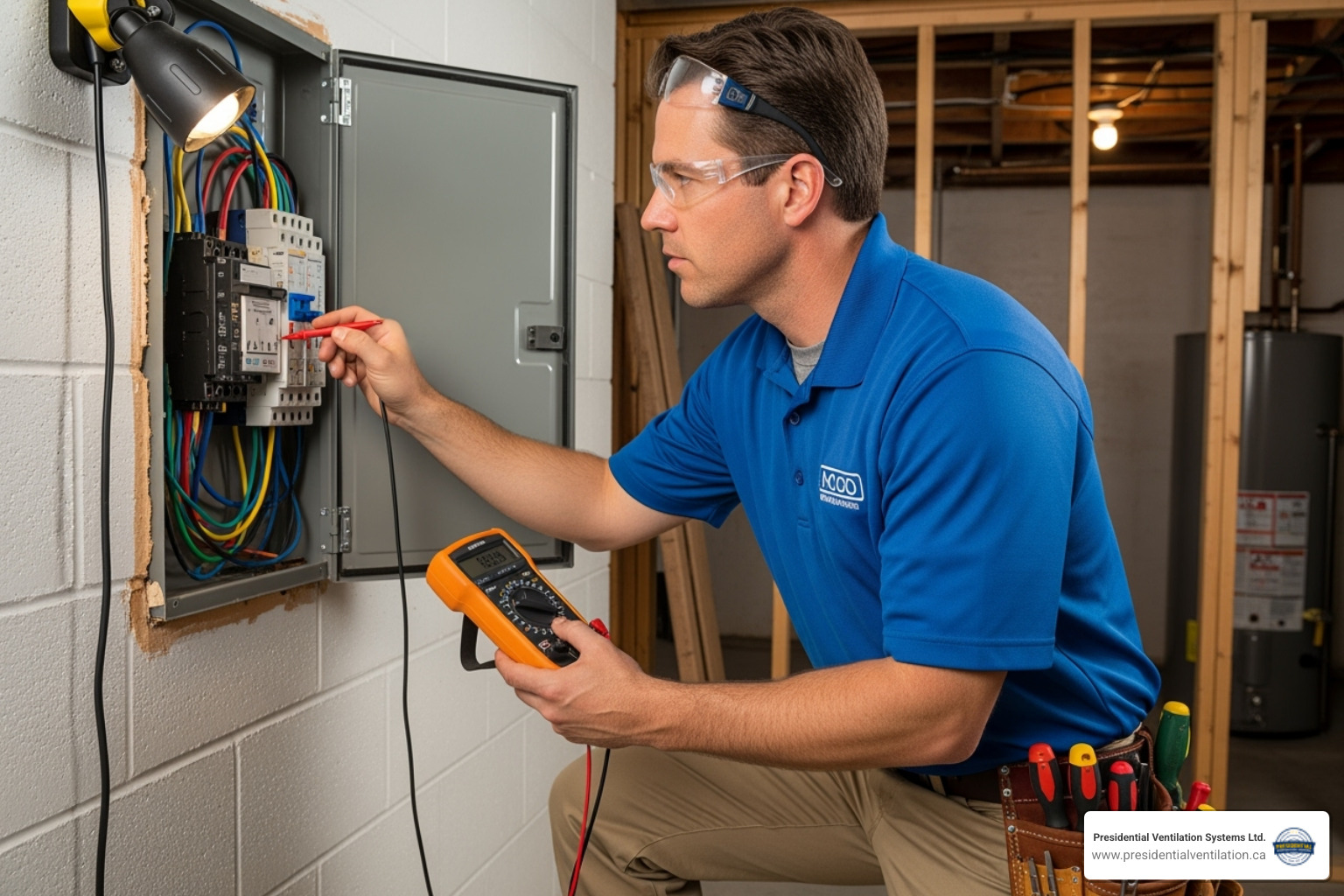
Your electrical panel is the heart of your home's power system, and a professional installation is essential for your family's safety. Safety regulations exist for a reason; professional electricians are trained in the latest electrical codes for working with high-voltage systems.
The DIY risks of a panel upgrade are significant. It involves disconnecting the main power and working with deadly high voltage, a task that requires years of training to master. With electrical issues causing over 51,000 fires annually, the breaker panel upgrade cost is a reasonable investment to prevent a devastating fire.
Choosing the right electrician is crucial. With over 30 years of experience serving Nova Scotia communities like Kentville, Truro, and Halifax, we understand what defines exceptional electrical work.
We are proud of our commitment to quality across all our work. You can learn more about all of our services, including electrical, HVAC, and insulation, on our website.
There are smart ways to manage your breaker panel upgrade cost without compromising safety.
The goal is long-term value. A properly installed panel will serve your family safely for decades, making it a worthwhile investment.
Here are answers to the most common questions we receive from Nova Scotia homeowners about electrical panel upgrades.
Most standard breaker panel upgrade projects are completed in a single day, taking four to eight hours. However, complex projects with unexpected issues like outdated wiring or panel relocation can take longer. We always provide a realistic timeline upfront.
Expect a temporary power outage for several hours during the installation. We coordinate with your utility company to restore power the same day. Our experienced crews work efficiently to minimize this disruption.
For most modern homes, 200-amp service is essential. Today's homes run numerous devices, from EV chargers to smart appliances, that older 100-amp panels often struggle to handle, leading to tripped breakers and flickering lights.
Future-proofing is key. A 200-amp panel accommodates future additions like an EV, a finished basement, or a hot tub, saving you from another upgrade later. For safety, a 200-amp panel prevents overloading, a common fire hazard.
While very large homes might need 400-amp service, 200 amps is the right choice for most Nova Scotia families, providing adequate capacity without overspending.
While not a dollar-for-dollar return on your breaker panel upgrade cost, an upgrade adds significant value when you sell.
The upfront investment pays long-term dividends in safety, convenience, and your home's appeal to future buyers.
After reviewing the costs, benefits, and process, is a panel upgrade a worthwhile investment? With over 30 years of experience serving Nova Scotia, we can confidently say yes.

Your electrical panel is the heart of your home's power system. When it's healthy, everything functions smoothly. The key benefits are clear:
The upfront breaker panel upgrade cost is a long-term investment. A quality panel lasts 25 to 40 years, breaking down to a small monthly cost over its lifespan. The practical value is immense: preventing costly fire damage, avoiding emergency repairs, and ensuring your home remains insurable.
The boost to market value is real. An upgraded panel is a strong selling point for savvy buyers, removing a major hurdle and potentially speeding up the sale.
Our customers often tell us, "I wish we'd done this sooner." The peace of mind from knowing your electrical system is safe is invaluable.
For over 30 years, Presidential Ventilation Systems Ltd. has helped Nova Scotia families upgrade their electrical systems. We serve communities across the province, including Kentville, Truro, Mount Uniacke, Halifax, Dartmouth, Bridgewater, Windsor, and Bedford. As a leading Daikin Comfort Pro Dealer, we apply our commitment to excellence to all our electrical and HVAC work.
Our licensed and insured electricians ensure your entire system works harmoniously, and we pride ourselves on transparent pricing, quality work, and strong customer relationships.
Don't let an outdated panel put your home at risk. If you're experiencing issues or planning additions, we're here to help.
Ready to take the next step? Contact us for a professional assessment. We'll evaluate your current system, explain your options, and provide transparent pricing for your specific situation. Your family's safety and your home's future are worth the investment.
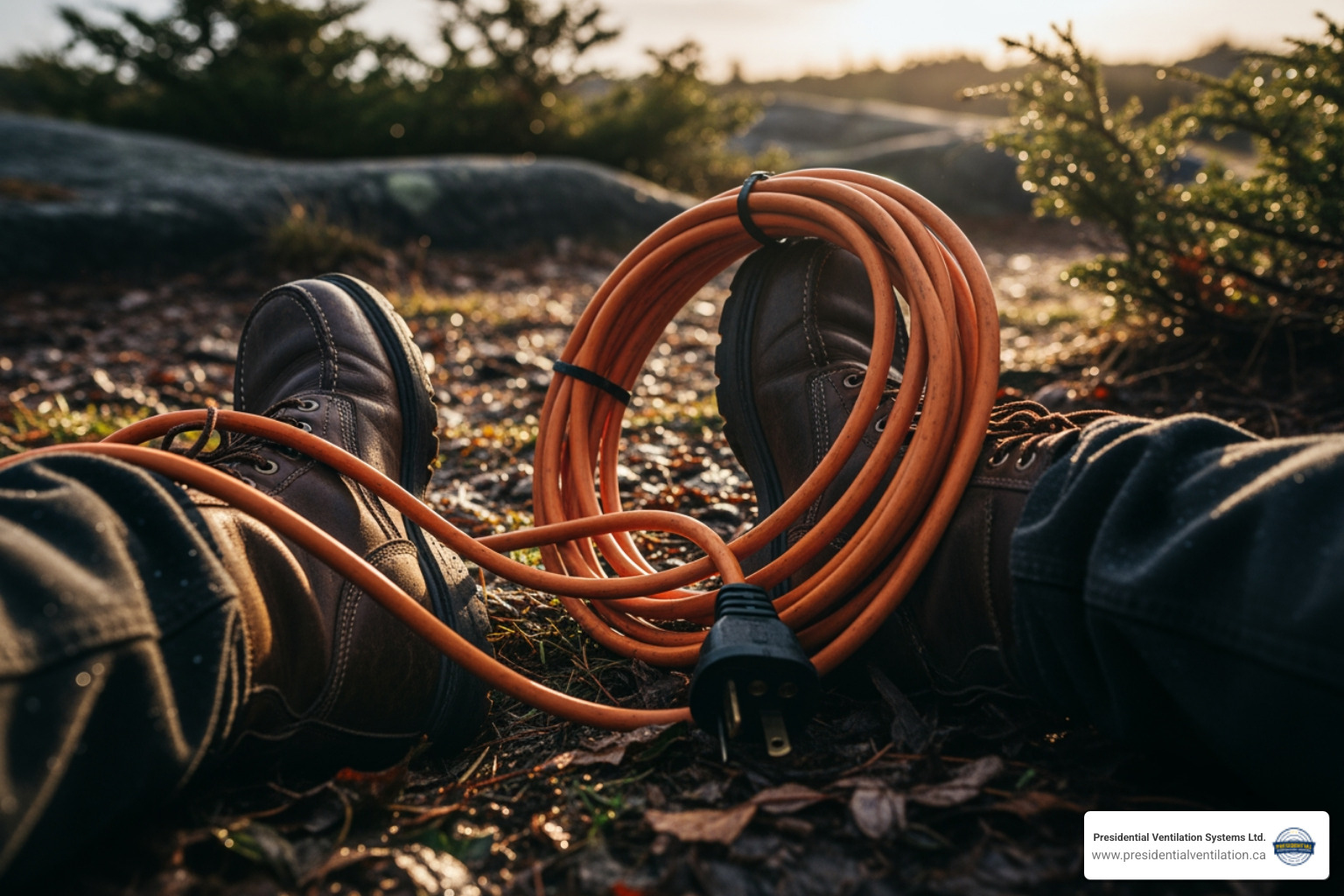


Finding electrical near me in indigo shores, ns means connecting with qualified professionals who understand your home's safety needs and local building requirements. Whether you're dealing with flickering lights, planning a renovation, or need to upgrade your panel to support modern appliances like heat pumps or EV chargers, choosing the right electrician protects your family and investment. Indigo Shores homeowners deserve reliable service from licensed experts who know Nova Scotia's electrical codes and can deliver work that's safe, clean, and built to last.
Quick Answer: Top Local Electrical Services in Indigo Shores, NS
For comprehensive electrical solutions across Nova Scotia, explore our full electrical services, or contact Presidential Ventilation to schedule a consultation with our certified team.
The Indigo Shores community features a mix of newer builds and established homes, each with unique electrical needs. Older properties may still have fuse boxes or undersized panels that struggle with modern loads, while newer homes often require specialized hookups for energy-efficient systems. Regardless of your home's age, working with a Red Seal certified electrician ensures your electrical system is safe, reliable, and ready to power everything from your HVAC equipment to your electric vehicle.
Living in Indigo Shores means enjoying beautiful surroundings and modern conveniences, but it also means ensuring your home's electrical system can keep up. From daily essentials to exciting new additions, our homes rely heavily on a robust and safe electrical infrastructure. We understand that every home has unique needs, and our team is equipped to handle a wide range of residential electrical services, ensuring your peace of mind.
For new construction projects in Indigo Shores, we provide comprehensive wiring services that lay the foundation for a safe and efficient home. This isn't just about running wires; it's about designing an electrical system that meets the demands of modern living, adheres to all current codes, and anticipates future needs. Planning for proper outlets, lighting, and dedicated circuits from the ground up can save you headaches and expenses down the line.
Home renovation projects, whether a kitchen remodel or a basement finishing, often require significant electrical work. Perhaps you're adding new appliances, repositioning outlets, or upgrading your lighting. Our experienced electricians can integrate new wiring seamlessly into your existing structure, ensuring everything is up to code and safely installed. We work closely with homeowners and other contractors to make sure the electrical aspects of your renovation are smooth and stress-free.
Lighting installation is another common request, changing spaces with improved ambiance and functionality. This can range from installing new pot lights that neatly brighten a living area to setting up outdoor security lighting that improves safety and curb appeal. We can help you choose and install fixtures that complement your home's aesthetic while providing optimal illumination.
As technology evolves, so do our homes' electrical demands. Electric Vehicle (EV) charger hookups are becoming increasingly popular, offering the convenience of charging your car right at home. Installing an EV charger requires a dedicated circuit and often an upgrade to your electrical panel to handle the increased load. Similarly, if you're dreaming of a hot tub or a new swimming pool, proper wiring is essential for safety and performance. These installations require careful planning and execution to ensure they meet all safety standards and local regulations. For more detailed information on these specialized connections, you can visit our page on Electrical Hookup Services.
Your electrical panel is the heart of your home's electrical system. It distributes power to all circuits and acts as a crucial safety device, tripping breakers to prevent overloads and short circuits. Many homes in Indigo Shores, especially older ones, might have outdated electrical panels that are simply not designed for the power demands of today's appliances and electronics.
Signs of an old panel include frequent circuit breaker trips, flickering lights when multiple appliances are running, or even the presence of an old fuse box instead of a modern breaker panel. Fuse boxes, while functional in their time, lack the safety and convenience of modern circuit breakers. If your home still has one, it's a clear indicator that a panel upgrade is overdue.
Upgrading to a 200-amp service is a common and highly recommended modernization for most homes. Older homes might have 60-amp or 100-amp panels, which struggle to power multiple high-demand appliances simultaneously. A 200-amp service provides ample capacity for modern necessities like large kitchen appliances, central air conditioning, home entertainment systems, and the increasingly popular heat pumps and EV chargers.
The benefits of a 200-amp service extend beyond simply powering more devices. It significantly improves the safety of your home's electrical system by reducing the risk of overloads and electrical fires. It also increases your property value and future-proofs your home for upcoming technological advancements. If you're considering a panel upgrade, we can assess your current system and recommend the best solution for your Indigo Shores home. Learn more about the benefits and process on our Panel Upgrade page.
Our homes often give us subtle clues when something isn't quite right, and your electrical system is no exception. Ignoring these warning signs can lead to bigger problems, including safety hazards. We believe in empowering homeowners in Indigo Shores to recognize these signals so you can call in a professional before a minor issue becomes a major concern.
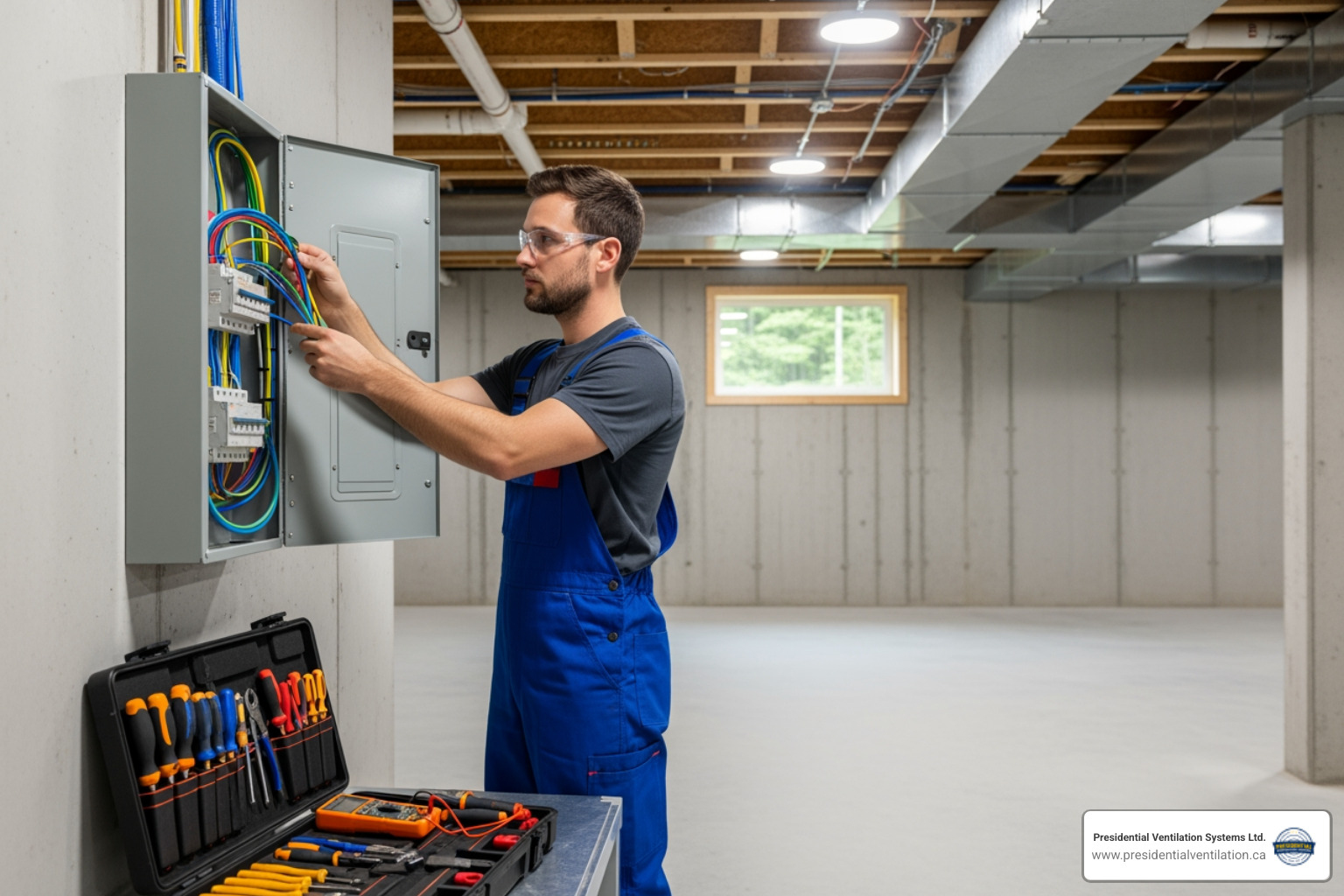
One of the most common indicators of an electrical problem is flickering or dimming lights. If your lights flicker when an appliance turns on, or if they constantly dim for no apparent reason, it could signal an overloaded circuit or loose wiring. It’s your home’s way of telling you it's struggling to get enough power.
Frequently tripped breakers are another red flag that should never be ignored. Circuit breakers are designed to trip when a circuit is overloaded, preventing overheating and potential fires. If a specific breaker trips often, even after you reset it, it means that circuit is consistently drawing too much power or there's a fault somewhere in the wiring. It’s not just an inconvenience; it’s a warning sign.
Unusual sounds like buzzing or crackling coming from outlets, switches, or your electrical panel are serious indicators of trouble. These noises can signify loose connections, arcing, or other internal electrical issues that could quickly escalate into a fire hazard. Similarly, if you notice any scorch marks or discolouration around outlets or light switches, it suggests excessive heat, which is extremely dangerous.
Finally, if your home still has outdated two-prong outlets, it’s a sign that your electrical system might not be grounded properly. Two-prong outlets lack a ground wire, which is a critical safety feature in modern electrical systems. This absence increases the risk of electrical shock and means sensitive electronics aren't protected from power surges. Upgrading these outlets is a crucial step towards improving your home's electrical safety.
While recognizing warning signs is important, a little preventative maintenance can go a long way in keeping your electrical system in top shape and avoiding issues altogether. Think of it like a regular check-up for your home's vital organs!
One simple but crucial task is testing your Ground Fault Circuit Interrupter (GFCI) outlets monthly. These are typically found in bathrooms, kitchens, laundry rooms, and outdoor areas – anywhere water might be present. To test, simply press the "TEST" button (it should trip the breaker or cause the "RESET" button to pop out), then press "RESET." If it doesn't trip, the GFCI may not be working correctly and should be replaced by a professional. This ensures they can protect you from electrical shock.
Regularly check all your electrical cords for damage, fraying, or exposed wires. Damaged cords are a common cause of electrical fires. Replace them immediately if you find any issues. It's also wise to avoid overloading circuits by not plugging too many high-wattage appliances into a single outlet or extension cord. If you're constantly relying on extension cords, it might indicate a need for more dedicated outlets.
Lastly, ensure your electrical panel remains accessible and uncluttered. Avoid storing items in front of it, as this can impede airflow and make it difficult to access during an emergency or for maintenance. Keeping the area around your panel clear is a simple step to improve safety and accessibility. For more information on maintaining a safe electrical environment in your home, we encourage you to explore our Electrical Safety Services Canada page.
When you need electrical work done in your Indigo Shores home, you're not just looking for "an electrician"; you're looking for the right electrician. Finding a qualified professional for electrical near me in indigo shores, ns is crucial for your home's safety and your peace of mind. We understand the importance of this decision, and we're here to guide you through the process.
Local expertise is invaluable. An electrician familiar with the Indigo Shores area and the broader Halifax Regional Municipality will have a better understanding of local regulations, common housing types, and even potential environmental factors that could impact electrical systems. They're part of your community, and that often translates to a greater commitment to quality and customer satisfaction.
Community reputation speaks volumes. Ask neighbours, friends, or local community groups for recommendations. An electrician with a strong local reputation has earned the trust of homeowners like yourself through consistent, reliable service. Reading customer reviews online is also a powerful tool. Platforms like Google Reviews (you can see our positive feedback here) can provide insights into an electrician's professionalism, communication skills, and the quality of their work. Look for patterns in feedback – positive comments about clear communication, punctuality, and clean work are always good signs.
The importance of clear communication cannot be overstated. A good electrician will listen to your concerns, explain the issue in understandable terms, outline your options, and provide a clear scope of work before starting. You should feel comfortable asking questions and confident that you understand the proposed solution.
When vetting potential electricians, certain credentials and practices are non-negotiable for your protection and for ensuring quality work.
First and foremost, always ensure your chosen electrician holds a Red Seal Certification. This interprovincial standard signifies a high level of competency and skill in the electrical trade. It means they have met rigorous national standards and are qualified to perform complex electrical work safely and effectively.
Proof of insurance and liability coverage is absolutely critical. Accidents can happen, and you need to be confident that the electrician and their work are fully insured. This protects you from financial responsibility in case of damage to your property or injury during the job. Never hire an uninsured electrician.
Years of experience also play a significant role. While newer electricians can be skilled, a company with a long-standing history, like our over 30 years in business, often brings a wealth of knowledge to complex or unusual electrical challenges. Experience often correlates with efficiency, problem-solving abilities, and a deeper understanding of various electrical systems.
Finally, as mentioned, positive customer Reviews are a strong indicator of a reliable and customer-focused provider. Look for reviews that highlight not just technical skill, but also professionalism, cleanliness, and respectful service.
Choosing a local electrician for your Indigo Shores home offers several distinct advantages that contribute to a smoother, more personalized service experience.
Local electricians often have a deep familiarity with local building styles and infrastructure specific to areas like Indigo Shores. They understand the nuances of homes in the community, whether they are older builds with unique wiring configurations or newer constructions requiring specific modern installations. This local knowledge can lead to more accurate assessments, quicker problem-solving, and more efficient project completion.
Furthermore, a local expert will be intimately familiar with regional codes and regulations in Nova Scotia. Electrical work must comply with the Canadian Electrical Code (CEC) and specific provincial and municipal bylaws. A local electrician ensures all work is up to code, helping you avoid potential issues with inspections, insurance, or future home sales.
Supporting local businesses contributes to the economic vitality of your community. It means you're investing in your neighbours and helping to create jobs right here in Nova Scotia. It's a feel-good bonus to getting excellent service!
Lastly, hiring local often translates to faster service coordination and more responsive communication. Local electricians are typically easier to schedule, can arrive more promptly for consultations, and are more accessible for follow-up questions or future projects. This proximity means less waiting and a more personalized experience overall.
Any electrical work performed in your Indigo Shores home isn't just about functionality; it's fundamentally about safety and compliance. In Nova Scotia, all electrical installations and modifications are governed by strict regulations designed to protect homeowners and ensure reliable power distribution.
The Canadian Electrical Code (CEC) forms the backbone of these regulations, setting the national standard for safe electrical installations. Nova Scotia building codes then adopt and sometimes adapt these national standards, along with adding specific provincial requirements. These codes dictate everything from wire sizing and outlet placement to grounding requirements and panel installations.
The importance of permits cannot be overstated. For most significant electrical work, such as panel upgrades, new circuit installations, or major renovations, a permit from the local authority (usually the municipality) is required. This permit ensures that the work will be inspected by a qualified electrical inspector to verify that it meets all applicable codes and safety standards. Skipping the permit process might seem like a shortcut, but it's a dangerous gamble that can lead to unsafe installations, difficulties with insurance claims, and problems when selling your home. A professional electrician will always handle the necessary permits and arrange for inspections, ensuring full compliance for safety and legality.
Investing in an electrical system upgrade for your Indigo Shores home offers a multitude of benefits that extend far beyond simply having more power. It's a smart investment in your property's safety, value, and future.
One of the most significant advantages is improved home safety. Older electrical systems, especially those with outdated panels or wiring, are more prone to hazards like overloads, short circuits, and electrical fires. An upgrade replaces worn components, ensures proper grounding, and provides modern circuit protection, drastically reducing these risks. It's like giving your home a vital safety overhaul.
An upgraded electrical system also significantly increases your property value. Potential buyers are often wary of homes with outdated electrical infrastructure, as they know it will be a costly and necessary renovation. A modern, compliant electrical system is a major selling point, signaling a well-maintained and safe home.
In today's energy-conscious world, upgrading your electrical system is often essential for powering modern, energy-efficient appliances. This includes heat pumps, which are excellent for both heating and cooling your home, and Electric Vehicles (EVs), which require dedicated charging stations. These high-demand devices often necessitate a panel upgrade to ensure your home can handle the load efficiently and safely. Without an adequate electrical system, you might not be able to take full advantage of these energy-saving and convenient technologies.
Finally, an electrical upgrade helps in future-proofing your home. As technology continues to advance, our electrical needs will only grow. By upgrading your system now, you're preparing your home for future smart devices, additional appliances, and whatever electrical demands tomorrow may bring. It's an investment that keeps your home functional and competitive for years to come. For more details on how an upgrade can benefit you, check out our Electrical Service Upgrade page.
We often hear similar questions from homeowners in Indigo Shores about their electrical systems. Here are some of the most common ones, along with our expert answers, to help you make informed decisions about your home's electrical needs.
Hiring a licensed electrician in Nova Scotia is not just a recommendation; it's a critical safety measure and often a legal requirement. Licensed electricians are trained to adhere to the Canadian Electrical Code (CEC) and Nova Scotia's specific building codes, ensuring all work meets rigorous safety standards. This code compliance is vital for preventing electrical hazards like fires and shocks. Without a license, there's no guarantee that the work is performed correctly or safely. Furthermore, your home insurance policy may be invalidated if unpermitted or unlicensed electrical work leads to damage. A licensed electrician provides peace of mind, knowing that a qualified professional is handling your home's vital electrical system, protecting your family and your investment.
There are several clear indicators that your Indigo Shores home might benefit from a panel upgrade. If your current electrical panel is over 20 years old, it's likely operating with outdated technology and may not be able to safely handle modern electrical loads. You might also need an upgrade if you're planning major renovations that involve adding new circuits or high-power appliances to your home. Installing high-power devices like a new heat pump, central air conditioning, an EV charger, or a hot tub almost always necessitates a panel upgrade to ensure your system can accommodate the increased demand. Finally, if your circuit breakers trip frequently, even after resetting them, it's a strong sign that your panel is struggling and needs an assessment.
Attempting do-it-yourself (DIY) electrical work is incredibly risky and should be avoided at all costs. The most severe risk is personal injury, including severe electric shocks, burns, or even electrocution. Improper wiring can also lead to fire hazards, putting your home and family in grave danger. Beyond the immediate safety concerns, DIY electrical work often results in code violations. These violations can lead to failed inspections, expensive rework required by a professional, and significant issues when you try to sell your home. Moreover, if an electrical fire or damage occurs due to unpermitted or unlicensed DIY work, your home insurance policy may be voided, leaving you responsible for all repair costs. For these reasons, always entrust electrical tasks to qualified, licensed professionals.
At Presidential Ventilation, we firmly believe that your home's safety and comfort are paramount. When it comes to something as crucial as your electrical system, cutting corners or delaying necessary maintenance is simply not an option. From preventing potential hazards to ensuring your home is equipped for modern living, professional electrical service in Indigo Shores is an investment in your family's well-being and your property's longevity.
We pride ourselves on offering reliable, high-quality electrical solutions delivered by our team of Red Seal certified electricians. With over 30 years of experience serving communities like Indigo Shores, we understand the unique electrical needs of homes in Nova Scotia. Whether you require a routine inspection, a comprehensive panel upgrade, new wiring for a renovation, or the installation of an EV charger, we are committed to delivering safe, efficient, and code-compliant work.
Don't let flickering lights or frequently tripped breakers become a source of stress or danger. Take the proactive step to ensure your home's electrical system is robust, safe, and ready for whatever life throws at it. For comprehensive and trusted electrical solutions right here in Indigo Shores, we invite you to connect with us. Learn more about our specialized services for your community by visiting our Electrical Services Indigo Shores NS page, or simply reach out to schedule a consultation. We're here to power your peace of mind.
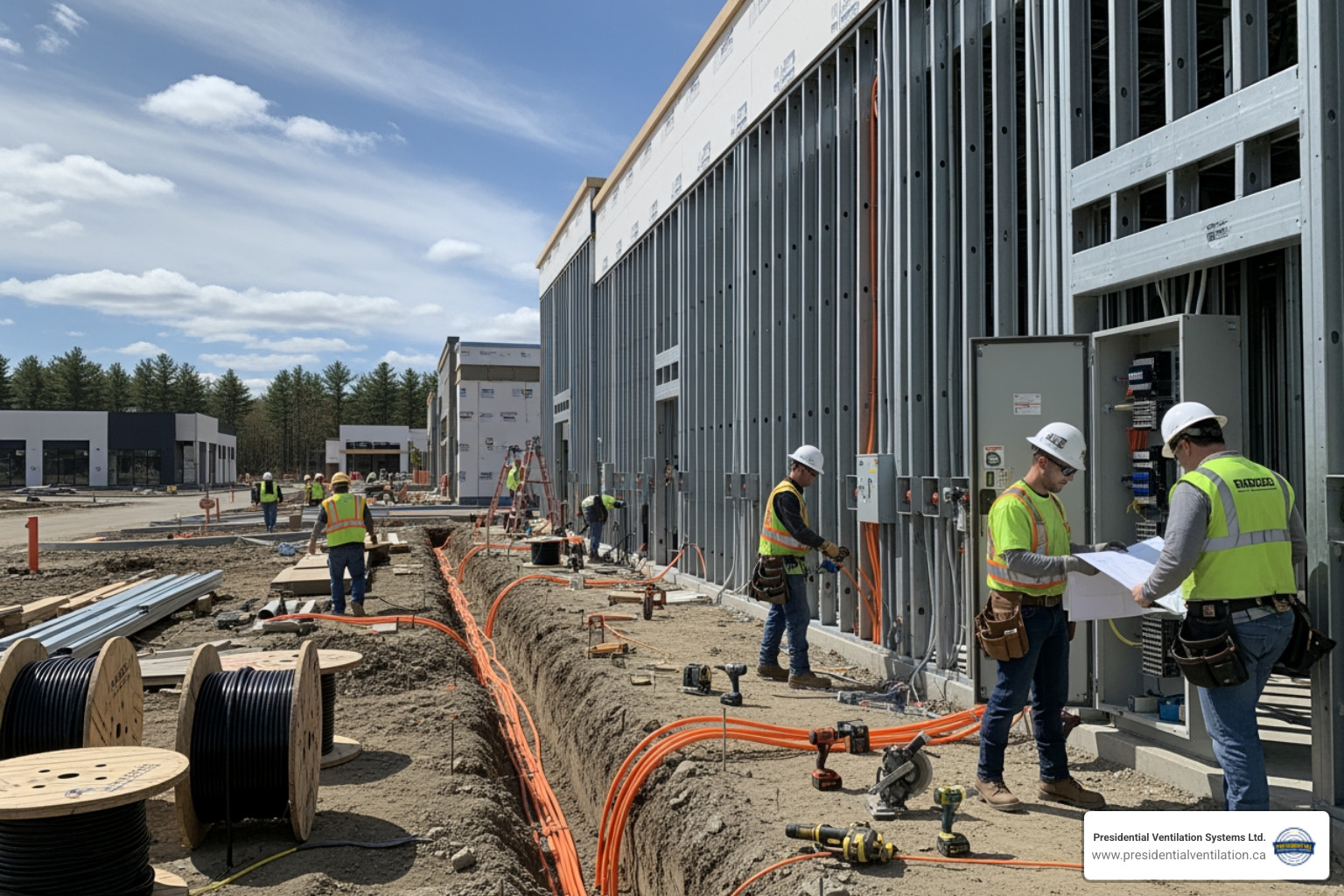


Running a business in commercial electrical in indigo shores, ns requires more than just a great product or service—it demands a reliable, safe, and efficient electrical infrastructure that keeps your operations running smoothly. Whether you're opening a new retail space, expanding an office, or managing a light industrial facility in this growing coastal community, your electrical system is the backbone that powers everything from lighting and computers to specialized equipment and climate control. Without proper electrical planning and maintenance, businesses face costly downtime, safety hazards, and compliance issues that can disrupt growth and profitability.
Quick Answer: Finding Commercial Electrical Services in Indigo Shores, NS
When searching for commercial electrical services in Indigo Shores, look for:
For comprehensive electrical support across Nova Scotia, explore electrical services in Halifax, Bedford, and surrounding areas, or contact Presidential Ventilation Systems for your commercial electrical needs.
This guide walks you through everything Indigo Shores business owners need to know about commercial electrical work—from understanding your facility's unique requirements to choosing the right services, ensuring safety compliance, and future-proofing your electrical infrastructure for long-term success. The coastal location and rapid development in Indigo Shores create specific electrical considerations that smart business owners need to address from day one.
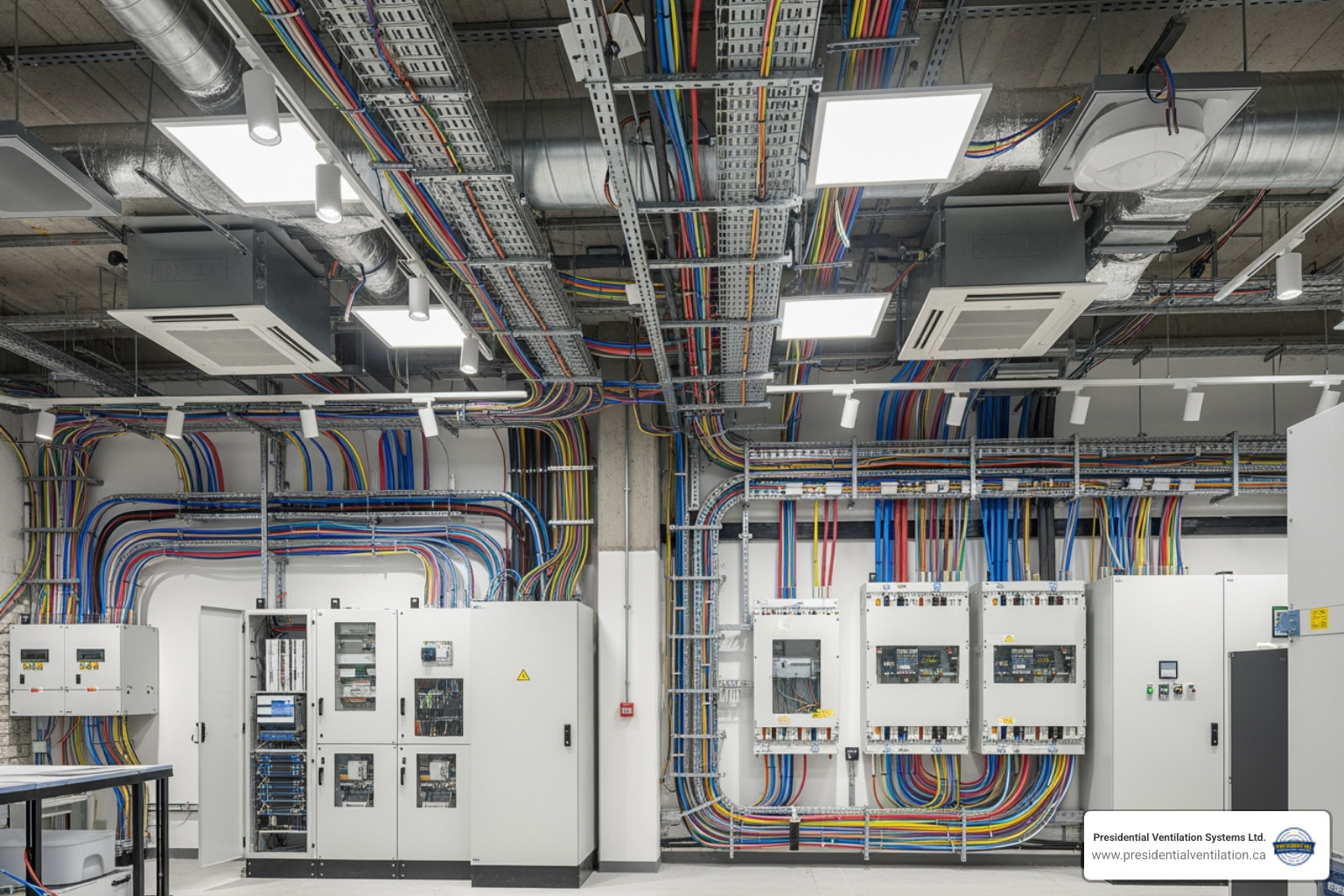
Indigo Shores is a community experiencing dynamic growth, attracting new residents and, consequently, new businesses. This growth means a diverse range of commercial electrical needs, from brand-new construction projects to the sophisticated requirements of modern retail spaces, busy office buildings, and specialized light industrial facilities. Each type of commercial venture has its own set of electrical demands, and understanding these is the first step toward a robust and reliable system.
In Nova Scotia, all electrical work must adhere strictly to the HRM building codes, which are designed to ensure safety and functionality. For businesses in Indigo Shores, this is particularly important as we also contend with the unique challenges presented by our beautiful coastal environment. Salt-laden air and varying weather patterns can impact electrical systems, requiring specialized considerations in installation, maintenance, and even Commercial electrical repairs. A deep understanding of these factors is crucial for any new build or existing setup.
No matter the industry, businesses in Indigo Shores share several core electrical needs that form the foundation of their operations. These include:
While the common requirements apply universally, Indigo Shores presents its own set of unique circumstances that impact commercial electrical planning:
A thriving business in Indigo Shores relies on an electrical system that's not just functional, but also robust, efficient, and adaptable. At Presidential Ventilation Systems, we understand that electrical work goes far beyond simply "making things light up." It's about providing a comprehensive suite of services that support your business's day-to-day operations and long-term goals. From initial setup to ongoing care, our expertise covers every aspect of commercial electrical needs, including new installations, strategic system upgrades, critical panel replacements, proactive preventative maintenance plans, and custom tenant fit-ups. We even assist with related services like Commercial HVAC installation to ensure all your building's essential systems are working in harmony.
When it comes to the electrical infrastructure of your business, quality installation and timely upgrades are paramount. We offer a full spectrum of services designed to power your commercial property effectively:
An ounce of prevention is worth a pound of cure, especially when it comes to your commercial electrical system. Our preventative maintenance plans are designed to keep your operations running smoothly, minimize unexpected downtime, and extend the lifespan of your electrical infrastructure.
Our preventative maintenance tasks typically include:
When it comes to commercial electrical in indigo shores, ns, safety and compliance aren't just buzzwords—they are non-negotiable foundations for any successful business operation. Electrical work inherently carries risks, and without strict adherence to established codes and regulations, businesses face severe hazards, including electrical fires, electrocution, and costly legal ramifications. Ensuring your electrical system is safe and compliant means protecting your employees, customers, property, and ultimately, your business's reputation and financial stability.
In Canada, all electrical installations must conform to the Canadian Electrical Code (CEC), which sets the national standard for electrical safety. Locally, Nova Scotia safety regulations and municipal bylaws, particularly those within the Halifax Regional Municipality (HRM), further define specific requirements for commercial properties. This includes obtaining the necessary municipal permits and undergoing mandatory inspections to ensure all work meets these stringent standards. Partnering with licensed and insured electricians is not just a preference; it's a critical step in safeguarding your workplace, ensuring liability protection, and preventing unforeseen dangers. For instance, businesses in nearby areas like Electrical services Bedford NS also face these same rigorous compliance requirements.
The Canadian Electrical Code (CEC) is a comprehensive set of rules and guidelines designed to ensure the safe installation and maintenance of electrical systems across the country. For commercial electrical work in Indigo Shores, strict adherence to these standards is paramount:
When it comes to your business's electrical system, attempting DIY solutions or hiring uncertified individuals is a risk you simply cannot afford. Professional service for commercial electrical in indigo shores, ns is truly non-negotiable:
In today's competitive landscape, every business is looking for ways to reduce operational costs and improve productivity. For commercial enterprises in Indigo Shores, smart electrical solutions offer a powerful avenue to achieve both. By embracing energy-efficient systems, such as LED lighting retrofits, integrating smart controls and automation, or even preparing for the future with EV charging stations, businesses can significantly lower their utility bills, improve their environmental footprint, and create a more comfortable and productive environment for employees and customers alike. It’s not just about saving money; it's about smart growth and sustainable operations. These electrical upgrades often go hand-in-hand with services like Commercial ventilation solutions, creating a holistic approach to building efficiency.
Investing in energy-efficient electrical upgrades for your Indigo Shores business yields a wide array of benefits that positively impact your bottom line and public image:
The business world is constantly evolving, and your electrical infrastructure should be ready to evolve with it. Future-proofing your business with modern electrical technology ensures you remain competitive and adaptable:
Starting on a commercial electrical project, whether it's a new installation, a significant upgrade, or a comprehensive maintenance plan, can seem like a daunting task. However, with a clear process and a trusted partner, it becomes a streamlined and manageable endeavor. At Presidential Ventilation Systems, we pride ourselves on a transparent and collaborative approach, guiding you through every step from the initial project consultation to the final walkthrough. Our goal is to make your commercial electrical project as smooth and stress-free as possible, ensuring minimal disruption to your daily operations. This structured approach is consistent across all our service areas, including when you're seeking a Commercial electrical Bedford NS guide.
When you decide it's time to address your electrical needs for commercial electrical in indigo shores, ns, here's what you can expect from our straightforward process:
We understand that having work done on your commercial property can be disruptive. That's why we are committed to making the process as seamless and respectful of your business as possible:
As we've explored, a robust, safe, and efficient electrical system is more than just a utility for businesses in commercial electrical in indigo shores, ns—it's a fundamental pillar of success. From understanding the unique demands of our coastal community and adhering to stringent safety codes to embracing energy-efficient solutions and planning for future growth, every aspect of your commercial electrical infrastructure plays a critical role. We’ve seen how essential professional installation, timely upgrades, and proactive maintenance are in ensuring business continuity, protecting your investments, and fostering a productive environment.
Indigo Shores is a community on the rise, and businesses here deserve an electrical foundation that can support their aspirations. At Presidential Ventilation Systems, we are proud to be a part of this growth, offering our expertise and dedication to the local commercial sector. With over 30 years of experience serving Nova Scotia, we bring a wealth of knowledge, a commitment to quality, and an unwavering focus on safety to every project we undertake. We understand the local landscape, the specific regulations, and the unique challenges and opportunities that businesses in Indigo Shores face.
We believe in building lasting relationships with our clients, providing not just services, but solutions that contribute to your long-term success. Our team is ready to ensure your electrical systems are not just up to code, but are also optimized for efficiency, reliability, and the future.
Contact us to discuss your commercial electrical needs in Indigo Shores, NS and let us help power your business to new heights.